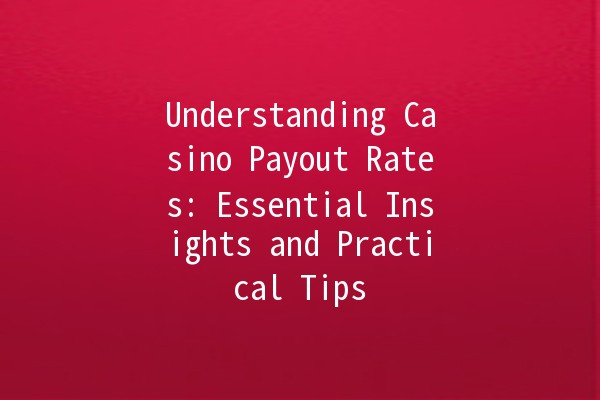Casino payout rates are a crucial aspect for any player wishing to maximize their gaming experience and potential returns. Payout rates, often referred to as "return to player" (RTP), indicate the percentage of wagered money that a casino will return to players over time. In this article, we will discuss how payout rates work, the significance of understanding these rates, practical tips to improve your gaming efficiency, and how to choose games that align with your payout preferences.
How Casino Payout Rates Work
Casino payout rates reflect the average return a player can expect over time. For example, a slot machine with an RTP of 95% means that for every $100 wagered, the machine will pay back an average of $95 in winnings, leaving the casino with a 5% edge. It's important to note that these percentages are calculated over long periods; individual sessions may vary significantly.
Importance of Payout Rates
Understanding payout rates is essential for anyone interested in maximizing their potential winnings. Here are some reasons why:

Practical Tips to Improve Game Selection
To navigate the world of casino games effectively, here are five practical tips that can help you make informed choices based on payout rates.
Before you start playing any casino game, it's imperative to research its RTP. Many online casinos list payout percentages on their websites. Use this information to compare different games. For example, if you find a slot game with a 96% RTP and another with a 92%, you might prefer the former to maximize your potential returns.
Example:
Let's say you research a popular online slot game and find that it has an RTP of 96%. You then compare it with another game that has an RTP of 88%. Based on the higher RTP, the 96% game becomes your preferred choice for playing.
High payout games aren’t just limited to slots; many table games like blackjack and video poker can offer competitive payout rates. Focus on finding these games, as they can significantly enhance your gaming experience.
Example:
Blackjack usually offers RTPs upwards of 99% when played with optimal strategy. Choosing blackjack over a slot with a 90% RTP gives you a better chance of walking away with a profit.
Along with RTP, game volatility—a measure of risk in slot machines and other games—is essential. High volatility games may pay larger amounts but less frequently, while low volatility games offer smaller wins more often. Choose a game that matches your risk tolerance and financial strategy.
Example:
A high volatility slot may show an RTP of 95% but may only pay out large sums every so often. If you're looking for steady play, a low volatility option with more frequent, smaller wins might be more suitable.
Many online casinos offer bonuses and promotions that can enhance your bankroll. Look for offers that provide free spins or deposit matches, but be sure to read the terms and conditions, particularly concerning the associated wagering requirements.
Example:
If you find a casino offering a welcome bonus that matches your initial deposit up to $200, and you’re playing a slot with a 95% RTP, that bonus can add significant value to your gaming budget, allowing longer playing times.
Maintaining a record of your gameplay can be a helpful strategy. By tracking which games yield positive results and identifying patterns in payout outcomes, you can refine your approach over time. This methodical tracking can inform future game choices.
Example:
If you keep a log of your sessions and discover that you consistently win with a particular video poker machine, focusing on that machine may improve your chances of winning in the long run.
Frequently Asked Questions
RTP, or Return to Player, is a percentage that indicates how much of the total wagered amount a game is expected to return to players over time. For example, an RTP of 95% means that, on average, players can expect to receive $95 back for every $100 they wager.
While lower RTP games can still be enjoyable, they are generally not recommended for players looking to maximize returns. The lower the RTP, the more the casino retains, making it less favorable over time.
Payout rates are typically based on extensive data collection over long periods. While casinos may regularly update their rates based on performance and player behavior, the figures reflect historical data rather than shortterm play.
Players cannot directly influence payout rates; however, their decisions in choosing games with higher RTPs and employing appropriate strategies can affect their chances of winning over time.
Promotions can significantly boost your bankroll, allowing for more opportunities to play and an increased chance to win. However, be mindful of the associated terms and conditions, particularly the wagering requirements linked to bonuses.
Both online and physical casinos offer a range of games with varying payout rates. However, online casinos often have higher RTPs because they have lower operational costs than brickandmortar establishments. This can lead to better returns for players.
By leveraging the knowledge of casino payout rates, players can make informed and strategic decisions that enhance their gaming experience and improve potential winnings. Understanding and utilizing these insights can transform a casual gaming session into a more profitable one, making your time at the casino truly rewarding.